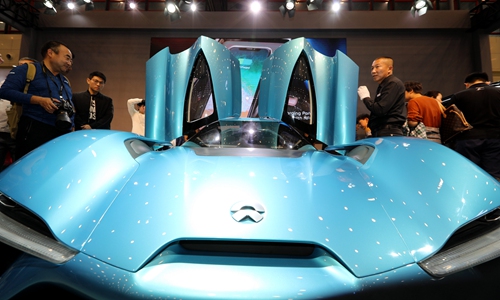HOME >> SOURCE
Subsidies will remain relatively stable this year: official
By Wang Sheng Source:Global Times Published: 2020/1/12 21:23:40

A new-energy vehicle produced by China-based NIO is showcased in Zhengzhou, Central China's Henan Province. Photo: CNSPhoto
With new-energy vehicle (NEV) subsidies set to remain stable this year, Chinese enterprises feel much more confident about development prospects for the sector, and they are committed to improving technology levels and reducing costs."Most NEV companies have largely benefited from subsidies, which are a lifeline for the industry in its early stages," Ji Hua, deputy general manager of Aerospace Engineering Equipment (Suzhou) Co, which is affiliated with the China Aerospace and Technology Corp, told the Global Times on Sunday.
Ji said that without government subsidies, profit margins of NEV companies would be squeezed, and sales may sink if companies can't meet customers' demand for lower prices.
Minister of Industry and Information Technology Miao Wei said on Saturday that China will not significantly cut subsidies for NEVs this year. Miao commented at the China EV100 Forum on Saturday.
"Faced with a heavy subsidy reduction on July 1, 2019, NEV insiders are concerned about whether the subsidy will be further reduced in 2020. Today, I can say that China will not cut subsidies after July this year," Miao said.
"I felt warm when I heard the upcoming new subsidy policy, which is a piece of significant news for the NEV sector," Ji said.
Miao said that NEV sales in 2019 exceeded 1.2 million units, generally flat with 2018, which means the negative impact of the subsidy cut policy is gradually fading.
"In fact, the quality of NEVs has significantly improved, and the market share of high-end new energy vehicles continues to increase. The cost of battery systems has dropped to less than 1 yuan ($0.15) per watt hour, and the lithium iron phosphate battery has been lowered to 0.60 yuan per watt hour, down 85 percent from 2009," Miao said.
Ji said that NEV enterprises should be proactive in increasing technology levels and reducing costs.
Cheng Wei, general manager of Potevio New Energy Co, said while the NEV industry has indeed shown a very vigorous development trend, it also faces various risks.
"The NEV industry should improve security including charging security, information security and energy security," Cheng added.
Zhong Xiangping, vice president of Chinese technology conglomerate Tencent, said at the forum that there is a trend of integration between the information industry and auto industry. Cutting-edge technologies including 5G and artificial intelligence are reshaping mobility.
Posted in: INDUSTRIES,MARKETS